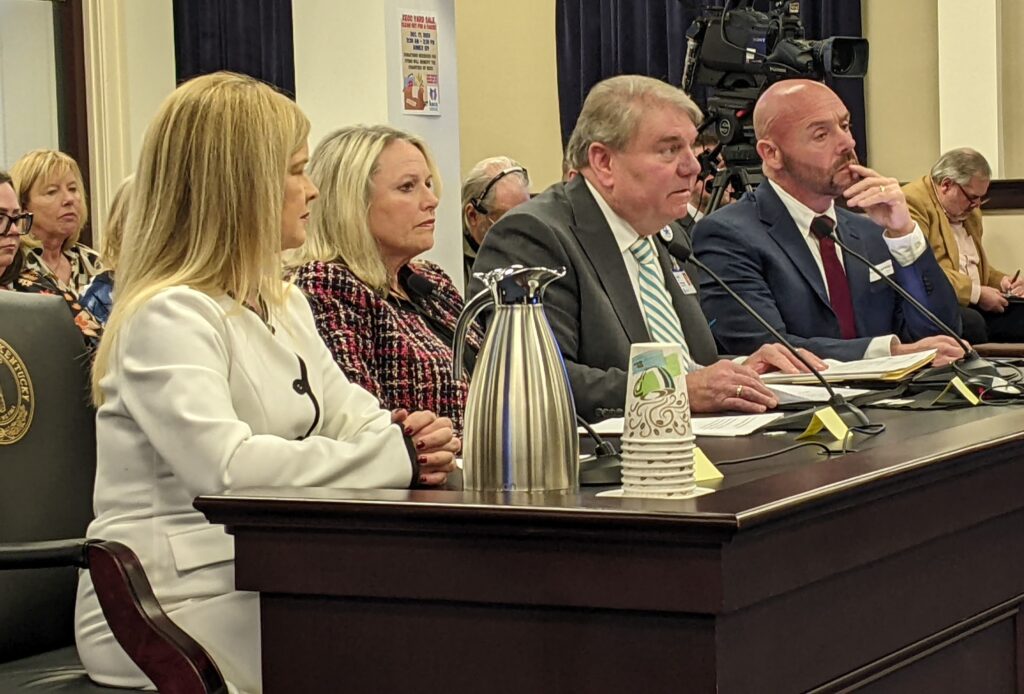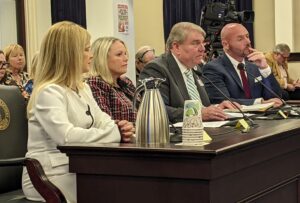Bill to ensure Ky. hospitals get same access to drug-discount program as other states passes first hurdle

Update, March 2, 2025: Senate Bill 14 passed out of the Senate Feb. 13 on a vote of 33-4. It awaits a committee assignment in the House.
By Melissa Patrick
Kentucky Health News
A bill to ensure Kentucky’s qualifying hospitals have the same access to a federal discount medication program as other states passed out of a state Senate committee Wednesday with bipartisan support. It now resides in the full Senate.

Nancy Galvagni, president and CEO of the Kentucky Hospital Association, told the members of the Feb. 5 Senate Health Services Committee that the refusal of the “large, pharmaceutical manufacturers” to deliver the medications that are covered by the 340B program to the state’s contract pharmacies creates massive losses for programs that patients need.
“Without the savings from the 340B program, critical health services that are being supported from those savings will become unaffordable,” she said. “Hospitals simply won’t be able to provide them, and the patients will be the ones to lose access.”
In urging the committee to vote for Senate Bill 14, sponsored by Sen. Stephen Meredith, R-Leitchfield, Galvagni said five states have already enacted this legislation, including Arkansas, Mississippi, Louisiana, Missouri and Maryland, and that at least 19 other states are working on similar legislation.
The 340B Drug Pricing Program, established in 1992, requires pharmaceutical companies to sell drugs to covered hospitals and their contract pharmacies at a discounted price, allowing Kentucky hospitals to then invest their 340B savings in programs and patient services that otherwise would not be available.
Executives from three rural hospitals spoke in detail about the services their hospitals are able to offer with the savings they get from the 340B program, including cancer care, specialty care, hepatitis clinics, family medicine clinics, addiction treatment and more.
Angel Portman, chief executive officer at Breckinridge Health Inc., a 25-bed hospital in Hardinsburg, told lawmakers that “the 340B program had undoubtedly saved our hospital.”
Kentucky Health News wrote in detail about Breckinridge’s financial struggles in 2019 after the Breckinridge County Fiscal Court voted against raising property taxes to shore up the hospital’s empty savings account. This was nearly two years after the hospital started participating in the federal 340B program, which Portman said allowed the hospital to “barely” break even in 2018.
Upon introducing the bill, Meredith, who is also chairman of the committee, read a section from what he called the essence of the two-page bill: “A manufacturer shall not discriminate, or cause others to discriminate, against a 340B covered entity by refusing or withholding 340B pricing for a covered drug if the manufacturer offers the same drug at a 340B price in any other state.”
He then told the committee that the discussion was to be about the bill’s content only, and not about the 340B program.
“We will not have a debate on 340B today,” he said. “We can’t change that. It’s federal law.”
Representatives from the Pharmaceutical Research and Manufacturers of America, or PhRMA, Biotechnology Innovation Organization and the National Alliance of Healthcare Purchaser Coalition spoke in opposition to the bill, with Meredith redirecting their comments several times, asking them to speak only to the bill.
Sen. Karen Berg, D-Louisville, said many of her constituents think that the discounted pricing from the 340B program should go directly to the patient, but explained that that is not how the program is set up.
“What people don’t understand is those actual patients will not have working health care facilities to be treated at without this program,” Berg said.
Galvagni agreed, telling Kentucky Health News that the broad purpose of the 340B program is to help safety net hospitals, which treat the highest percentages of Medicare, Medicaid and vulnerable patients, stay open and to help them provide more health care services to the whole community.
According to the Health Resources & Services Administration, the 340B program is designed to allow qualifying hospitals “to stretch scarce federal resources as far as possible, reaching more eligible patients and providing more comprehensive services.”